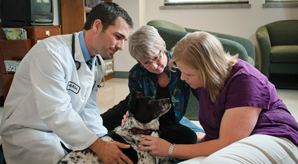Argus Institute
Processing Grief
These are some ideas to help as you process your grief for your beloved companion:
Give Yourself Permission to Grieve
You've experienced a tremendous loss. You deserve the opportunity to grieve as you need to. Surround yourself with others who understand the bond you had with your companion animal and who you can openly talk with about your grief without fear of judgment. Try and pay no heed to comments from misunderstanding individuals.
Acknowledge and Express Your Feelings
This can help release some of the energy from within you and allow you to gain perspective. Talk with those you trust. If you have difficulty talking about your feelings with others, journaling or writing a letter may be a helpful way to process your emotions. Some other creative expressions that capture your feelings may include creating artwork with clay, oils, pastels, painting, drawing, designing a shadow box or collage, and writing stories or poetry.
Identify What Has Been Helpful with Past Losses
You already have a wealth of coping skills that you've created throughout your life. Regardless of the magnitude of previous losses, from misplacing keys to losing a loved one, you made it through those losses using your strength and skills. Identify what has helped before and call on that now.
Give Yourself Permission to Backslide
Grief is neither predictable nor unavoidable. It just happens. Grief can overcome you in waves of emotion, ebbing and flowing much like the tides of an ocean. This loss is causing a lot of changes in your life and it will take time for you to adapt.
After a loss, you experience many firsts; the first morning to not fill the food bowl, the first afternoon to not go for a walk, the first time to go to bed without sharing your pillow, the first time you watch television with an empty lap, first birthday after a loss, first anniversary of the death and so on. These events can knock you backwards into strong grief emotions for a while. Be aware and prepared for these events so you can give yourself permission to grieve strongly again. It can help to call in advance on those who support you.
Be Patient with Yourself
Grieving a significant relationship takes time, much more time than society sanctions. Go easy on yourself!
Find a Special Way to Say Goodbye to Your Pet
Society promotes rituals for humans such as funerals and receptions. Create your own ritual for your pet, a loss often as significant as that of a human. You can write an obituary, hold a celebration of your pet's life, donate to a cause in your pet's name, plant a tree or bush, or create something. If the loss was unexpected, you can write a letter or talk to a photo of your pet, telling him all the things you didn't get a chance to say. You can also write a letter from your pet, expressing what he or she would say to you, something only you could know for sure.
Do Something that Brings You Joy
Allowing yourself to smile doesn't mean you miss your pet any less, only that you are taking care of yourself through your heartache.
Special Considerations for Children & Grieving
The death of a family pet is often a child's first experience with loss. Children experience grief also, though their age and development levels influence their grief reactions. They express grief differently than adults due to shortened attention spans and varying intellectual levels of understanding death and loss. Each child is unique and overlap occurs across levels of development. You can use our Involving Children Through Pet Illness and Death overview as a guide.

